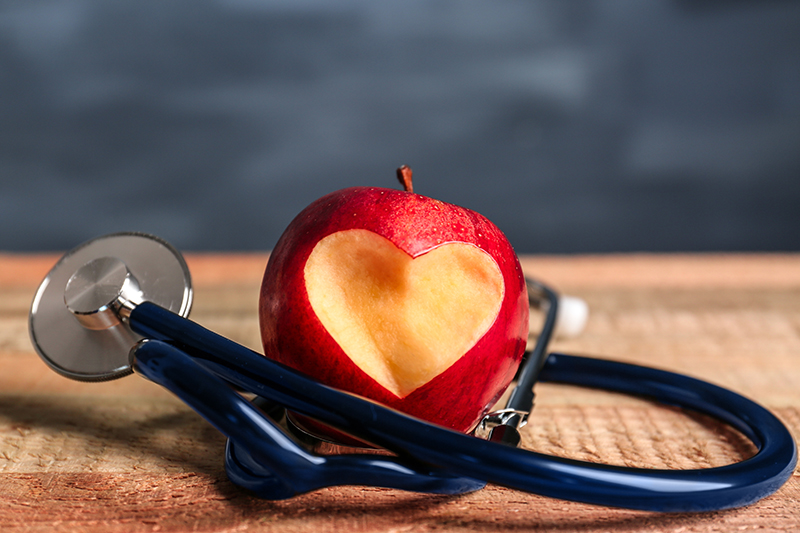Lower Blood Pressure with Cranberry Juice
 Typically cranberry juice is thought of as a home health remedy to treat urinary tract infections (UTI’s). Some recent research indicates cranberry juice may also promote lower blood pressure levels.
Typically cranberry juice is thought of as a home health remedy to treat urinary tract infections (UTI’s). Some recent research indicates cranberry juice may also promote lower blood pressure levels.
Let me begin by stating these study results are preliminary. More research needs to be conducted. The study, funded by Ocean Spray Cranberries, was published as an abstract and the results have not yet been peer-reviewed and published in a journal. Results were reported at a meeting of the American Heart Association in Washington, DC.
Placebo Controlled Study
Continue reading
5 Steps to Achieve a Healthy Heart

You don’t have to begin a drastic diet in order to achieve your heart health goals. Big results can be achieved by improving your daily habits one step at a time.
Here are 5 steps you can implement now for a healthy heart:
Step 1 – Add fruits and vegetables to your daily diet
That’s right, I’m not telling you to eliminate a food, but to add foods. Fruits and vegetables are essential. Add fruit and/or vegetable to every meal or snack to boost your intake of this necessary food group. It’s estimated that our intake of vegetables is usually only 59% of what it should be and fruit only 42%.
Step 2 – Switch processed grains for whole grains
Continue reading
Reduce Your Heart Attack Risk
 Is the deck stacked against you when it comes to genetics and heart disease? If so, I’m right there with you. However, this isn’t a pass to just say “oh well, nothing you can do about it” and proceed to live an unhealthy lifestyle.
Is the deck stacked against you when it comes to genetics and heart disease? If so, I’m right there with you. However, this isn’t a pass to just say “oh well, nothing you can do about it” and proceed to live an unhealthy lifestyle.
Heart disease and heart attacks are for the most part preventable. Deaths due to coronary heart disease have significantly decreased since 1980.
Here are 5 steps you can take right now to beat the odds:
- Know your numbers
Go to the free health screenings to have your cholesterol and blood pressure checked. Discuss with your doctor to determine how often more in depth lab work should be completed. Ignorance is not going to help you.
For cholesterol, the American Heart Association provides the following recommendations:
Continue reading
Weight Loss Pills: Do they work?
 I’ve been asked many times about the safety of taking a weight loss supplement (i.e. diet pill) when living with high blood pressure or taking blood pressure medication.
I’ve been asked many times about the safety of taking a weight loss supplement (i.e. diet pill) when living with high blood pressure or taking blood pressure medication.
My answer doesn’t vary:
“I do not recommend diet pills – whether you have high blood pressure or not.
Many weight loss supplements contain “undeclared pharmaceutical ingredients”, frequently in levels exceeding FDA recommendations. These ingredients include drugs not approved in the U.S. These substances impact blood pressure and anti-seizure medications, diuretics, along with drugs linked to suicide, depression, and cancer.”
Not only can weight loss supplements lead to negative health consequences, they don’t typically work.
Continue reading
High Dietary Salt Equals High Blood Pressure
 Earlier this month (February 2012), the Centers for Disease Control and Prevention (CDC) released a report showing that nine out of ten adults eat too much salt daily.
Earlier this month (February 2012), the Centers for Disease Control and Prevention (CDC) released a report showing that nine out of ten adults eat too much salt daily.
This excess salt is not the salt you are adding with the salt shaker. The high salt diet comes from processed foods and restaurant meals.
A diet high in sodium (salt) leads to high blood pressure. This equals an increased risk for developing heart disease and having a stroke.
According to CDC director Dr. Thomas Frieden, heart disease and strokes are responsible for the deaths of more than 800,000 Americans annually and add approximately $273 BILLION dollars to health care costs.
The U.S. Dietary Guidelines recommend salt be limited to no more than 2300 milligrams per day. This recommendation may be even lower (no more than 1500 milligrams per day) depending on your ethnicity, age, and medical history.
The average adult in the U.S. consumes more than 3300 milligrams of salt each day.
10 Foods Contributing the Most Sodium
Continue reading
Which is better for your health? Wild, Brown, or White Rice?
 There are several different varieties of rice. Most people were raised eating white rice and continue to do so. However, the different types of rice provide different nutritional benefits. Let’s look specifically at white rice, brown rice, and wild rice.
There are several different varieties of rice. Most people were raised eating white rice and continue to do so. However, the different types of rice provide different nutritional benefits. Let’s look specifically at white rice, brown rice, and wild rice.
White Rice
White rice has been milled so that the husk, bran, and germ are removed leaving you with a refined product. During this process, the rice is polished giving it the bright, white, shiny appearance we expect.
By removing these layers the flavor, texture, and appearance of the rice is changed and the shelf life is extended as it is now less likely to spoil.
Nutrients are removed during the processing, such as the B vitamin thiamine. Due to this depletion of nutrients, white rice is usually enriched. This means some the nutrients removed during processing are added back in, such as thiamine, niacin, and iron.
Brown Rice
Continue reading



